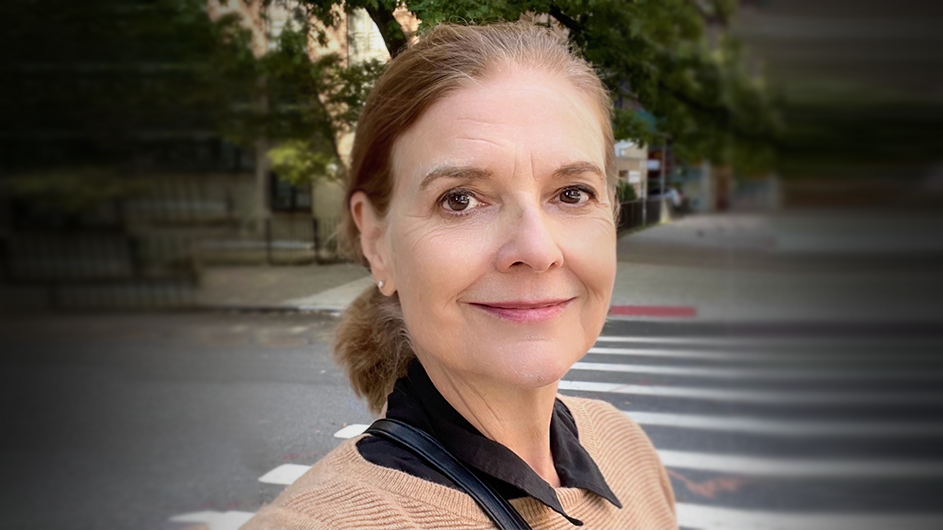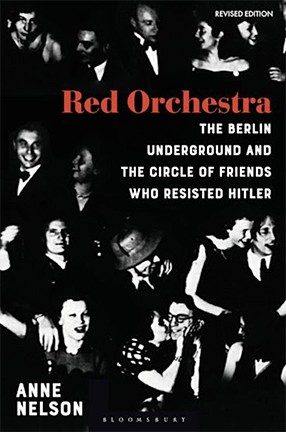A Book About an Anti-Nazi Resistance Movement Has Implications for Today
Anne Nelson’s Red Orchestra warns about the fragility of all democracies, and how citizens need to be vigilant.

Red Orchestra: The Story of the Berlin Underground and the Circle of Friends Who Resisted Hitler, by Anne Nelson, a research scholar at Columbia School of International and Public Affairs, tells the dramatic story of a group of German citizens who opposed Hitler from the start. The 150 or so members of the Rote Kapelle (Red Orchestra) resistance movement chose to stay in Germany to resist Nazism and help its victims. The group was made up of academics, theater people, and factory workers; Protestants, Catholics, and Jews; people from all walks of life.
Drawing on archives, memoirs, and interviews with survivors, Nelson presents the men and women involved, and the terrifying, day-to-day decisions in their lives, from the Nazi takeover in 1933 to their Gestapo arrest in 1942. Nelson traces the Red Orchestra within the context of German history, from the 1920s to the end of World War II. She also constructs the narrative around the life of Greta Kuckhoff and other women, whose role in the anti-Nazi resistance fight is too often unrecognized or under-appreciated.
Nelson discusses the book with Columbia News, and why a revised edition was recently published, along with what she’s read lately and plans to read next, and who her next group of dinner guests might be.
Why was this book revised now? What makes it especially relevant today?
I began work on Red Orchestra in 2001. I was motivated by the desire to better understand the dynamics of anti-authoritarian resistance movements, following my experience reporting from military dictatorships in El Salvador and Guatemala in the 1980s. When the book was published in 2009, it received a warm critical reception in both the U.S. and Germany as a new way of looking at the German resistance. For decades, I warned audiences that Red Orchestra should not be read as merely a German story—all democracies are fragile, and can be manipulated by bad actors. Citizens need to defend democratic institutions before they are degraded beyond recognition. The new edition of the book, released in the context of recent history in the U.S. and Western Europe, stresses this point.

Can you talk about Greta Kuckhoff and/or other women whose role in the anti-Nazi resistance fight is often unacknowledged?
Kuckhoff was keenly aware of the dangers of Nazism at a time when many dismissed it. In the 1930s, she realized that the English translation of Hitler's Mein Kampf omitted some of its most inflammatory passages, and assisted in a full translation as a warning to the English-speaking world. During the war, her friend Libertas Schuze-Boysen took a position in Joseph Goebbels’ documentary film unit, where she beguiled soldiers returning from the Eastern Front to share photos and accounts of war crimes committed against Jewish and other civilian populations. She copied and archived these materials with the intention of presenting them for future prosecution. Her actions were a prototype for Human Rights Watch and other contemporary organizations.
What books have you read lately that you would recommend, and why?
I just returned from a humanitarian trip to Cuba, where I read Ada Ferrer's brilliant book, Cuba: An American History. I've been reporting on the radical right's fusion of religion and fossil fuel interests, and I've been learning about the growing political influence of the New Apostolic Reformation movement. Two essential books on these topics are André Gagné's American Evangelicals for Trump, and Matthew Taylor's forthcoming The Violent Take It by Force: The Christian Movement That Is Threatening Our Democracy.
What's next on your reading list?
I've currently got Tom Holland's book, Dominion: How the Christian Revolution Reshaped the World, at the top of the pile. Next is Patrick Modiano's Le Place de l'Étoile, which I'm reading in connection with a possible television series based on my book, Suzanne's Children. My book tells the story of Suzanne Spaak, who risked and gave her life to save hundreds of Jewish children from deportation from Nazi Paris to Auschwitz.
What are you teaching now?
I'm not teaching this semester, but I've been doing extensive speaking, both at Columbia and beyond. Over the past month, I've given a talk at Columbia SIPA on Red Orchestra, and I spoke at Columbia Journalism School on my most recent book, Shadow Network: Media, Money, and the Secret Hub of the Radical Right.
What are you currently working on?
I continue to do follow-up reporting from Shadow Network for the Washington Spectator, The New Republic, and other publications. I'm also collaborating with a marvelous French showrunner on—as I mentioned earlier—a possible streaming series based on my book, Suzanne’s Children. I expect the interviews on politics to continue to pick up as the election approaches.
Which three academics/scholars, dead or alive, would you invite to a dinner party, and why?
I've got a weakness for antiquity. I'd invite Sydney Babcock, the curator of the Morgan Library's magnificent recent exhibition, She Who Wrote: Enheduanna and Women of Mesopotamia, ca. 3400-2000 B.C. Also on the guest list would be English classicist Mary Beard, because she's so engaging on the subject of ancient Rome. To round things out, I'd add the scholar John Dominic Crossan, with his perspective on the birth of Christianity in the context of the Roman Empire.